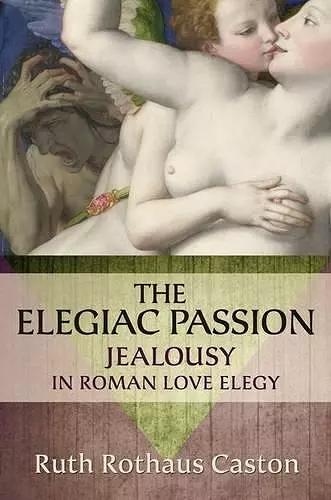The Elegiac Passion
Jealousy in Roman Love Elegy
Format:Hardback
Publisher:Oxford University Press Inc
Published:13th Sep '12
Currently unavailable, and unfortunately no date known when it will be back

The passions were a topic of widespread interest in antiquity, as evidenced by the recent surge of interest and research in the emotions in Greek and Roman literature. Until now, however, there has been very little focus on love elegy or its relation to contemporary philosophical positions. Yet Roman love elegy depends crucially upon the passions: without love, anger, jealousy, pity, and fear, elegy could not exist at all. The Elegiac Passion provides the first investigation of the ancient representation of jealousy in its Roman context, as well as its significance for Roman love elegy itself. The poems of Propertius, Tibullus, and Ovid are built upon the presumed existence of a love triangle involving poet, mistress, and rival: the very structure of elegy thus creates an ideal scenario for the arousal of jealousy. This study begins by examining the differences between the elegiac treatment of love and that of philosophy, whether Stoic or Epicurean. Ruth Caston uses the main chapters to address the depiction of jealousy in the love relationship and explores in detail the role of the senses, the role of readers--both those internal and external to the poems--, and the use of violence as a response to jealousy. Elegy provides a multi-faceted perspective on jealousy that gives us details and nuances of the experience of jealousy not found elsewhere in ancient literature. She argues that jealousy turns centrally on the question of fides. The fear of broken obligations and the consequent lack of trust are relevant not only to the love affair that forms the subject of these poems but to many other relationships represented in elegy as well. Overall, she demonstrates that jealousy is not merely the subject matter of elegy: it creates and structures elegy's various generic features. Jealousy thus provides a much more satisfying explanation for the specific character of Roman elegy than the various theories about its origins that have typically been put forward.
This is an engagingly written, creative, and frequently very persuasive book. * Rebecca Armstrong, Classical Journal *
Caston handles some important issues in a wide-ranging discussion ... her inclusion of the views of modern psychologists and philosophers on jealousy makes for a welcome extra dimension. * Paul Murgatroyd, Journal of Roman Studies *
This highly nuanced analysis is richly textured, accessible to a broad range of readers, and supported by an excellent, useful scholarly apparatus. Highly recommended. * CHOICE *
ISBN: 9780199925902
Dimensions: 163mm x 239mm x 20mm
Weight: 400g
192 pages